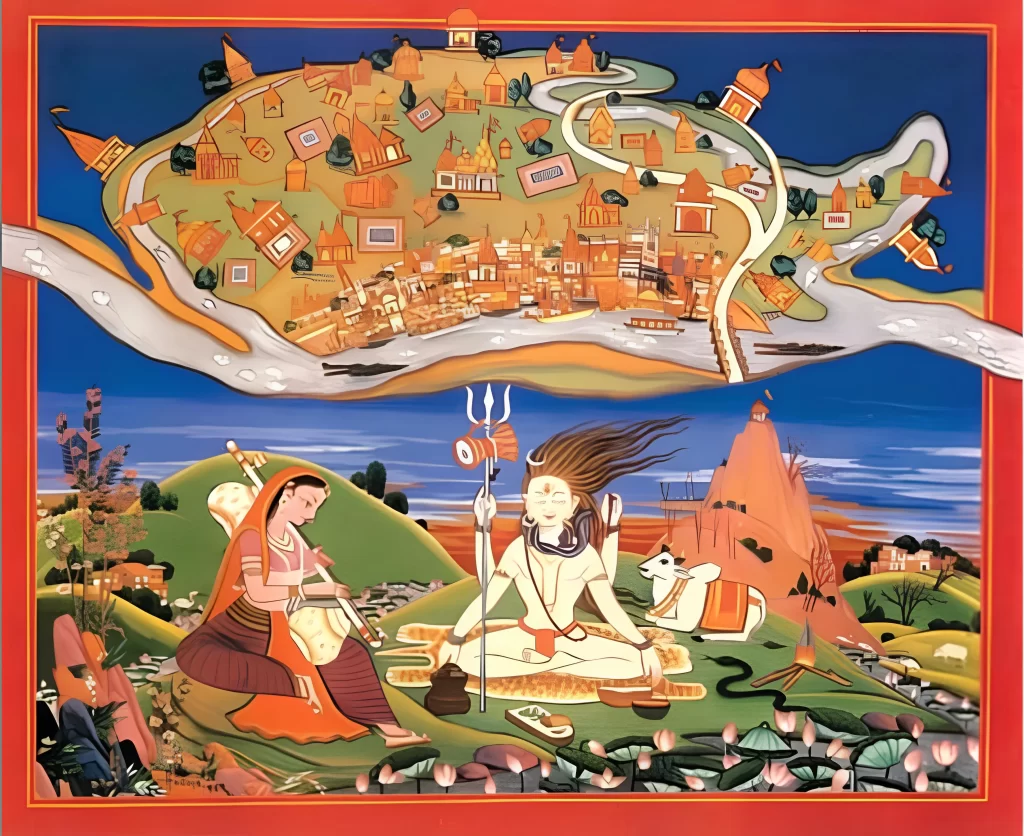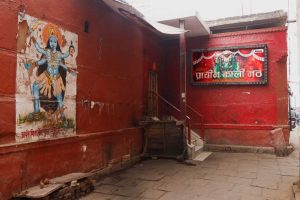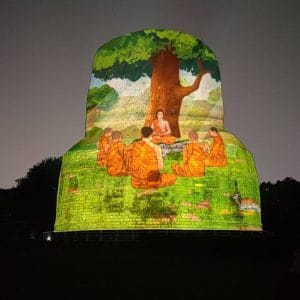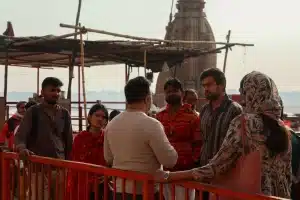Varanasi, as they say, is older than history and has been home to multiple dynasties, civilizations, and even gods. It is so old that it is mentioned in some of the oldest texts such as Rigved and has been called by different names. This rich history has bestowed upon the city a multitude of names, each carrying a unique story. Scrolling through Instagram reels I found myself captivated by the different names creators use in their reels for Varanasi today. So we asked people to share all the names they were aware of on our Instagram account and the outcome was extremely interesting(though nobody got them all but a few of them shared a lot of unique ones).
I’m happy to share a collection of Varanasi’s names, their meanings, and stories while acknowledging that this may not be an exhaustive list.
Varanasi
| Pronounced | Vaa-raan-uh-see |
| Earliest Mention | 10th century CE |
Varanasi, the official name of the city is made up of two words, Varuna and Assi both being the tributary river of Ganga. The earliest written mention of the name can be found in Rājaśekhara’s Kāvyamīmāṃsā a 10th Century CE text & Vaman Purana which is also dated 9-10th Century CE. The name gained popularity around the time of the Delhi Sultanate and has been the official name of the city from 1910 till now.
Kashi
| Pronounced | Ka-she |
| Earliest Mention | 8th – 4th century BCE |
Kashi is one of the oldest and most popular names of varanasi used in literature and history. “Kashi” word is taken from a Sanskrit word, Prakasha which means light. The symbolic meaning of Kashi is related to spiritual enlightenment & knowledge.

The earliest mention of the name in texts dates back to the 15th century BCE in Atharva Veda. It is also mentioned in Jain & Buddhist texts(6th-2nd Century CE). The historical evidence suggests the existence of a kingdom named “Kāsi” around the 2nd millennium BCE. The ongoing excavations in Varanasi have found artifacts belonging to 1800 BCE, indicating the presence of a settled community in the region even before written references to the name appear.
Banaras
| Pronounced | Buh·naa·ruhs |
| Earliest Mention | 17th century |
Banaras or Benaras is the most common name of Varanasi used today in all kinds of texts and movies. In comparison to its counterpart Varanasi, it sounds a little more poetic making it a preferable choice for people and artists to use today.
Tum, Main, Chai or Banaras
– A rejoiced influencer on her Instagram
Tracing the history of the name Banaras is a tough task as there is no real evidence available. However, Our Walk Guru Nishant suggests “The name doesn’t have a Hindi meaning but it’s more likely a phonetic variation of the word Varanasi which became popular in the 18th century” and the same is accepted by scholars & historians. However, a few scholars suggest that it’s a portmanteau of two Urdu words “Bana” meaning “always ready”, and “Ras” symbolizing the “juice of life”. The earliest mention of the word Benaras (the British variation of the word Banaras) first occurred in the travel account of Pietro della Valle, a French traveler who visited the city in 1623.
However, the term “Banarasi” has been used in the Pali language for Varanasi (which goes back to 1st – 4th BCE).
Aanandavana / Ananad Van / Ānandakānana
| Pronounced | Ah-naan-d-vuhn |
| Earliest Mention | 6th-12th CE |
Aanandavana is a Sanskrit word meaning “the forest of bliss” and it’s been in use for centuries to mention Kashi in texts. It is the name that truly describes the essence of Banaras. This is the forest of bliss where Tulsi Das met Hanuman, Kabir Das met his guru, Trailanga Swami found his adobe, Bismillah Khan played Shehnai, and so on. This is the forest bliss, it is where the magic happens.
Avimukta or Avi Mukta Kshetra
| Pronounced | A-vi-muk-ta |
| Earliest Mention | 5th-10th CE |
The Avimukta is also one of the oldest names of Varanasi. The word Avimukt means liberated or free. As per the Hindu scriptures being cremated in varanasi librates the person from the cycle of life and death hence giving it the name “Avimukteshwar / AVi Mukta Kshetra” meaning the land of liberation. The name was first mentioned in Ling Purana and used for the Shivling of the same name situated near Shri Kashi Vishwanath Temple.
Mahashmashana
| Pronunciation | Ma-ha-shma-sha-na |
| Earliest Mention | 12th CE |
Mahashmashana or Maha Shamshan means “The Great Cremation Ground” This name’s been given to varanasi due to the presence of Manikarnika Ghat. The word Mahashmashana appeared first in Sakand Puran.
The Skanda Purana explains the name “Mahasmashana” (great cremation ground) associated with Varanasi. It breaks down as “Maha” (great), “sma” (corpse), and “Shana” (final rest). The text explains that during the universe’s dissolution, even powerful beings find their final rest here, making it a great cremation ground.

Puranic myths further reinforce this association. Lord Shiva himself is said to have declared, “Assuming the form of Death-god at this place I destroy the world.” Additionally, the five basic elements (earth, water, air, fire, and sky) are believed to exist here like corpses, contributing to the name.
This association with final rest continues today, with two major cremation ghats (Harishachandra and Manikarnika) along the Ganges, witnessing the cremation of over 50,000 individuals annually.
Rudravasa
| Pronunciation | Ru-dra-va-sa |
| Earliest Mention | 12th CE |
As the name suggests it means the adobe of Shiva. It is believed that even the grain of sand in Kashi is a form of Shiva himself. From the inanimate objects of Kashi to its people, all are believed to be the form of Shiva.
Surandhana
Surandhana means wealth of Gods as sura stands for Gods and Dhana stands for wealth in Sanskrit. The term Surandhana first appeared in the Jataka tales of Buddhism. It also loosely means a city between two rivers.
Apart from these, names like Brahma Vardha and Ramya have been used historically to write about varanasi. A city that predates history and has been so diverse in culture, it wouldn’t be astonishing if 100 more names had existed before the practice of writing was established.

Having completed this initial list I find myself even more curious to learn of additional names. I will add the ones I find here for you to learn about them, and if you know any, please feel free to reach out to us so we can add them to the list and help curious explorers of Banaras like ourselves who might stumble upon this page in the future.












